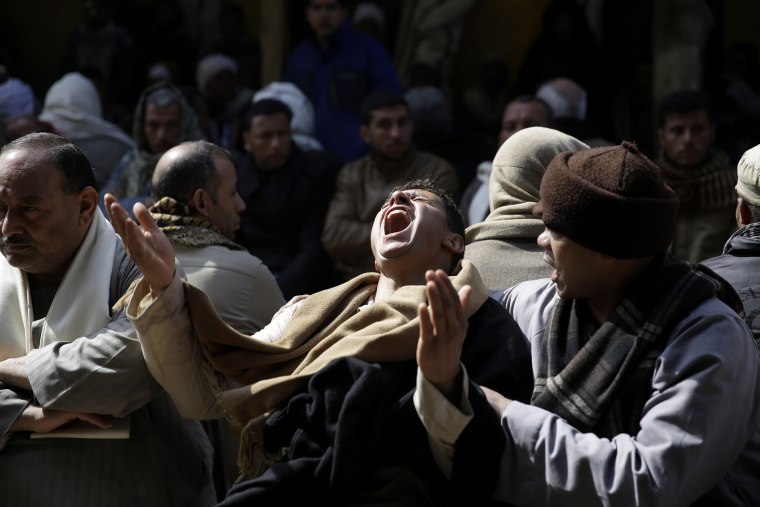With the brutal murder of 21 Egyptians at the hands of ISIS in Libya, many are questioning how the brutal terrorist group has spread into North Africa. What do Libya and Syria, ISIS’s main base of operation have in common? On the surface, not much, but they do share one central characteristic: They are both failed states.
Four years ago, both Libya and Syria witnessed populist uprisings against their ruling regimes. And as expected, those regimes responded by crushing the dissent with brute force killing thousands. In Libya, the international community intervened. A NATO coalition launched airstrikes to stop the military advances of Muammar Gadhafi from slaughtering his own people. In Syria, the international community condemned Bashar Al Assad’s attack on his own people but fell far short of building a military coalition to stop him.
The two case studies — one for the case of international intervention (Libya), the other for international inaction (Syria) — have led some to rightfully question whether the international community is "damned if we do and damned if we don’t" by getting involved in the strife ravaging parts of the Arab world. But that approach may prove to be shortsighted.
In Libya, the international community’s involvement was short-lived. Once the NATO-led intervention was over, Libya was largely left to its own devices. With no central government or any state institutions capable of exerting control over the territory, the country failed to chart a transparent way to an elected government representing all of the forces competing for power. The result was a failed state that slowly slid into chaos.
Today, Libya has two competing governments. In the west, a coalition of militias calling itself Libyan Dawn controls the capital city, Tripoli, along with outlying areas. In the east, an internationally recognized government mostly in name is based in Tobruk. In the absence of a central government, extremism has flourished. ISIS and other groups have taken footholds in the country, including in Derna, where ISIS has been firmly in control for months.
RELATED: What ISIS wants and the US war strategy
In Syria, the international community, paralyzed by the geopolitics of the region, has been unable to press the Security Council to take direct action to stop the fighting that has cost hundreds of thousands of lives. Syria, unlike Libya, is a proxy war with regional powerhouses like Saudi Arabia, Turkey and Iran backing different factions involved in the fighting. That means the Damascus-based government lacks control over its entire territory and warring factions that vary on the ideological spectrum. Syria, too, is a failed state where extremism has flourished.
Libya is a launching pad for migrants trying to make their way to Europe, and no other country is feeling that pressure more than Italy. Its tiny town of Lampudusa has taken thousands of illegal immigrants. Italian authorities have been ringing the alarm bells for months. Now they are calling on the U.N., along with Egypt, to do more to restore order in Libya including possible military intervention. Italian officials want the U.N. to consider deploying an international peacekeeping force to bring Libya back under control of a central government and end the bloodshed.
"Libya is a launching pad for migrants trying to make their way to Europe, and no other country is feeling that pressure more than Italy."'
Egypt is reeling from the chaos in Libya, too. The border between the two countries is long and porous. Hundreds of thousands of Egyptian citizens work in Libya. And the black market for weapons in Egypt has been a flush from weapons coming from Libya.
But Egypt wants the international community to stand firmly behind it in its own domestic fight against terrorism, particularly in the Northern Sinai Peninsula. To the Egyptian government, there is no difference between the Muslim Brotherhood, it Islamist supporters and terrorists.
Not everyone agrees with that characterization. Human rights activists in Egypt worry the country’s government is capitalizing on the fear of ISIS and the chaos in Libya to strengthen and consolidate its own grip on power by silencing all forms of dissent. The West may be compelled to turn a blind to Egypt’s worsening human rights abuses and violations in exchange for Cairo’s more prominent role in combating regional terrorism in Libya, Syria and Iraq. Egypt has been a regional lynchpin of security and the new President Abdel Fattah el Sisi is calling on its Islamic institutions to counter ISIS’ ideology.
With so much change in the region, so many policies of the past are re-emerging: Relying on strongmen and militaries to combat terrorism while keeping the international community from direct involvement in attempting to meaningfully end these conflicts in failed states.
